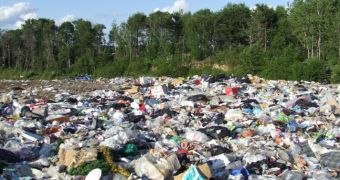World's largest landfill seems to be represented by Jardim Gramacho (Gramacho Gardens) located outside of Rio de Janeiro. The dirtiest place in the world succeeds in collecting 9,000 tonnes of waste every year.
Trash has been turned into profit by thousands of poor people who will remain “unemployed,” after the government applies its regulations which will shut down major landfills all across Brazil, until the end of 2012.
For 15,000 inhabitants, their daily bread is dipped in 800 cubic meters of liquid containing a highly toxic mixture of waste coming from hospitals, domestic and industrial waste.
As we speak, the government tries to eradicate open dumps while looking for another proper home for up to 70% of Brazil's entire amount of waste, which otherwise threatens to end up on the streets.
In order to help the authorities cope with this emerging issue, eco-groups joined efforts to keep the waste problem under control.
Recycling campaigns organized all across Rio de Janeiro managed to collect an impressive amount of no-longer-used paper, plastic and glass, while also organizing classes in order to increase the level of education and awareness regarding this topic.
Their strategy attracted international support, since students from MIT offered their help after elaborating an inexpensive vegetable oil filter which should take care of the quantity of oil the volunteers collect.
This strategy started being highlighted in 2010, through the Green Grease Project. Although it seemed successful on paper, the project depended on the usage of hazardous chemicals, which need special training and equipment.
Keeping this impediment in mind, the students focused on developing a more traditional technology. Therefore, they decided to operate modifications to two diesel engines running on biodiesel manufactured out of WVO (waste vegetable oil).
Unlike other kinds of biofuels, WVO requires special attention and maintenance, due to the fact that, once lost, the quantity can easily pollute the environment. According to a recent study, 1 litre of WVO has the potential to affect up to 23,000 liters of water.
After benefiting from financial aid, the people involved in this project are able to use an elaborated system which allows them to filter up to 250,000 liters of WVO. So far, the cooperative managed to collect and transform only 10,000 liters every month, when their target reaches 40,000 liters.
All in all, we're dealing with a green start and an ice-breaker in fostering the significant amount of waste vegetable oil which will remain orphan from 2012, after all the open dumps will be closed by the Brazilian authorities.

 14 DAY TRIAL //
14 DAY TRIAL //